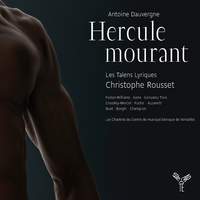Recording of the Week,
Rare baroque vocal delights
This autumn is yielding such a cornucopia of baroque vocal delights that I barely know where to start, but today I want to tell you about two settings of popular plots by little-known composers – both of whom really deserve to be heard more frequently.

First up is Leonardo Vinci (no relation to the artist!), who penned operas at a staggering rate during the 1720s before dying in mysterious circumstances involving poison and a jealous husband! I fell in love with his vital, often startlingly innovative music two years ago after working on a revival of one of his operas and there’s very little of his work on disc, so I fell on this starrily-cast Artaserse like a hawk! The great baroque librettist Metastasio referred to his text for Artaserse as ‘the most fortunate of all my children’: this tale of skulduggery and divided loyalties in ancient Persia was set by nearly fifty composers during the eighteenth century, though only a few settings have made it onto modern stages and recordings (some of you may remember Chris’s feature on Arne’s Artaxerxes a year or so ago).
Vinci’s score is a revelation: there’s something so very distinctive about his raw, red-blooded sound-palette, and he has such imaginative ways with Metastasio’s famous metaphors (listen first to the astonishing ‘Vo solcando un mar crudele’ at the end of Disc One, surely one of the most original of the many baroque arias about ships on stormy seas!). The opera was written for Rome, and because of the papal ban on women appearing on stage all the female roles were taken by castrati. Max Cencic (who conceived the project and also sings the king’s sister, Mandane, with blazing theatricality) has assembled a crack team of high-voiced male singers here: I hesitate to call them countertenors, given that almost everyone’s required to soar up to high As and beyond!
Philippe Jaroussky’s plangent timbre is ideal for the title-role, which is predominantly lyrical: the vocal drama really centres on his best friend Arbace, who is framed for the king’s murder by his Machiavellian father (Daniel Behle, supremely venomous in the sole tenor role) as part of a convoluted plot to seize the throne. Franco Fagioli really makes his mark here, fully exploiting the pathos and the virtuosic demands of the writing. We should hear much more of him on disc, and soon! Special mention for Yuriy Mynenko: I was inundated with enquiries about this exciting Ukrainian after his sensational performance in the 2009 Cardiff Singer competition, and he's electrifying as the court bully-boy Megabise: his gleefully lecherous ‘Sogno il guerriero’ is one of the stand-out arias on the set.
I’ll confess that I’d never heard of Antoine Dauvergne (1713-97) until a copy of his Hercule mourant landed on my desk last week. I’m so glad to have made his acquaintance: he’s an almost direct contemporary of Gluck, but his treatment of Hercules’s death-by-poisoned-cloak also has, to my ears, a lot in common with the sound-world of Rameau. Andrew Foster-Williams is a nuanced, multi-faceted Hercules, and no-one does French Classical tragedy quite like Véronique Gens, who sings his wronged wife Déjanire (a far more sympathetic character than in Handel’s better-known setting – Dauvergne’s Hercules is indeed in love with the princess Iole, and there are some crackling scenes where bickering gods and goddesses plot to goad Déjanire into jealous insanity). One of the main pleasures of the disc for me, though, was the discovery of some wonderfully fresh new French voices: Jael Azzaretti’s unaffected, vernal soprano is delicious, especially in the tiny aria for an unnamed ‘Thessalian Woman’, and I’ll be seeking out more of Alain Buet after hearing his baleful Jupiter.
Two rarities which are well worth exploring, then – sound-samples below
Andrew Foster-Williams (Hercule), Véronique Gens (Déjanire), Emiliano Gonzalez Toro (Hilus), Edwin Crossley-Mercer (Philoctète), Julie Fuchs (Ïole), Jaël Azzaretti (Dircé), Alain Buet (La Jalousie, Jupiter), Jennifer Borghi (Junon) & Romain Champion (Le Grand Prêtre de Jupiter), Les Chantres du Centre de musique baroque de Versailles & Les Talens Lyriques, Christophe Rousset
Available Formats: MP3, FLAC, Hi-Res FLAC



